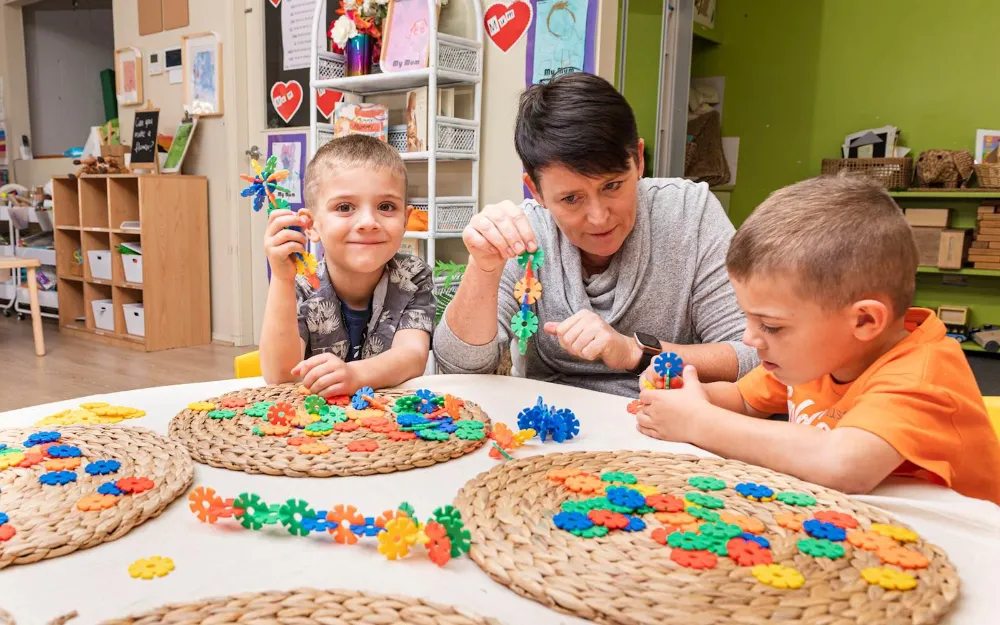Nursery Teacher Interview Questions and Answers

Source: verbnow
Nursery Teacher Interview Questions and Answers
Congratulations! You’ve taken the first step towards a fulfilling career as a nursery instructor. The process begins with a successful interview, during which your abilities, passion, and capacity to handle those tiny bundles of joy will be tested.
We’ve gathered a list of frequent nursery teacher interview questions and answers with insightful solutions to help you prepare and shine. So, let’s get started and make you ready to shine!
Preparing for a nursery teacher interview? Gain the confidence you need with Vidhyanidhi Education Society’s Nursery Teachers’ Training Course.
This blog provides essential nursery teacher interview questions and answers essential to help you demonstrate your skills and expertise.
Get ready to crack your interview confidently and become a skilled and proficient nursery teacher!
Table of Content

Source: growingroomberlin
Most Common Nursery Teacher Interview Questions and Answers
Preparing for a nursery teacher interview? Here are some of the most common Nursery interview questions and answers with effective context that will enable you to showcase your skills and land that dream job in early childhood education.
Q: How do you handle a child who is reluctant to separate from their parents in the morning?
A: Ah, the classic “clingy moments”! I believe in creating a warm and welcoming environment for both children and parents. I’ll employ techniques such as building rapport, engaging the child in a fun activity, or having a special “goodbye routine” to make the transition smoother. By focusing on establishing trust and comfort, we can turn those teary goodbyes into confident waves.
A: Social and emotional growth is at the heart of early childhood education. I would incorporate activities that encourage cooperation, empathy, and self-expression. From group projects to storytelling sessions, I aim to create an inclusive and supportive classroom environment where children learn to navigate emotions, build friendships, and develop a strong sense of self.
Q: How would you manage a child’s challenging behavior, such as aggression or defiance?
A: Handling challenging behavior requires a balance of patience, understanding, and effective communication. I would employ positive reinforcement techniques, redirect their attention to more appropriate activities, and teach them problem-solving skills. A firm but gentle approach, combined with consistent boundaries, can help channel their energy into positive outcomes.
The above Most common Nursery Interview Questions and answers will give you a clearer vision of what to expect when you are preparing to land up a great job in your lap.
Q: How do you incorporate play-based learning into your teaching methodology?
A: Because play is a child’s natural method of learning, I consider it a crucial component of my teaching strategy. I would design a dynamic atmosphere filled with age-appropriate toys, games, and hands-on activities that encourage creativity, critical thinking, and problem-solving abilities. By blending learning with play, we can foster a love for exploration and ignite a child’s natural curiosity.
Q: How do you involve parents in their child’s learning journey?
A: Collaboration between teachers and parents is crucial for a child’s holistic development. I would maintain open lines of communication through regular progress reports, parent-teacher meetings, and interactive workshops. By fostering a strong partnership, we can create a seamless connection between home and school, ensuring consistent support for each child’s growth.
Q: How would you handle a child who constantly seeks attention and interrupts during class activities?
A: Ah, the little attention seekers! I would employ a mix of positive reinforcement and redirection techniques. By acknowledging their contributions and providing them with designated roles or responsibilities, we can channel their energy in a constructive way. Additionally, I would create clear expectations for turn-taking and teach them effective communication skills, gradually reducing interruptions and fostering a more harmonious learning environment.
For More details Call / Whatsapp us at +919869546913 / +919869866277
For Downloading the brochure click here

Source: momnewsdaily
Q: How do you incorporate multiculturalism and diversity into your teaching approach?
A: Embracing diversity is crucial in today’s multicultural society. I would integrate culturally diverse books, music, and art into the curriculum, celebrating different traditions and fostering an inclusive atmosphere. By encouraging open discussions and promoting respect for different perspectives, we can create a classroom that values and appreciates the richness of our diverse world.
Q: How do you handle a child’s curiosity about sensitive topics, such as death or differences in physical appearances?
A: Children are naturally curious, and it’s important to address their questions in an age-appropriate and sensitive manner. I would create a safe space for discussions, using simple and honest explanations that respect their developmental level. Encouraging empathy, kindness, and emphasizing the uniqueness of each individual can help children embrace differences and navigate sensitive topics with understanding.
Q: How would you foster a love for learning and exploration in young children?
A: Instilling a love for learning starts with making education a fun and engaging experience. I would design interactive lessons, incorporating hands-on activities, field trips, and outdoor play. We can cultivate children’s innate curiosity and produce lifelong learners by encouraging them to ask questions, follow their interests, and investigate the world around them.
Q: How do you deal with a youngster that is struggling in school or falling behind their peers?
A: Each kid learns at their own rate, and it is our responsibility as instructors to give individualized help. I would identify their specific needs, create individualized learning plans, and offer extra assistance through one-on-one sessions or targeted interventions. By boosting their confidence and focusing on their strengths, we can help them overcome challenges and reach their full potential.
Q: How do you promote a positive parent-teacher relationship and maintain effective communication?
A: Building a strong partnership with parents is essential for a child’s holistic development. I would establish open lines of communication, offering regular updates on their child’s progress, achievements, and areas for growth. Parent-teacher conferences, newsletters, and online platforms can facilitate ongoing dialogue, ensuring a collaborative approach to supporting each child’s journey.
Q: How do you handle a child’s emotional outbursts or conflicts between peers?
A: Conflicts and emotional outbursts are normal parts of a child’s social and emotional development. Often the atmosphere at home has repercussions at school which have to be handled cautiously. I would establish a caring and safe atmosphere in which children feel heard and encouraged. By teaching them healthy conflict-resolution skills, encouraging empathy, and modeling positive behavior, we can empower them to navigate their emotions and build strong relationships with their peers.
At Vidhyanidhi Education Society, we believe in equipping aspiring nursery teachers with comprehensive knowledge and practical skills to excel in their profession. Our Nursery Teachers’ Training Course goes beyond interview preparation, providing a holistic curriculum that covers child development, teaching methodologies, assessment techniques, and classroom management strategies.
Join our accredited Preschool teaching program and begin on a path of fun, growth, and limitless opportunities for influencing young minds.
Let us work together to provide a better future for our children!
Remember that while preparation is important, being true to yourself and demonstrating your real love for early childhood teaching will set you apart in every nursery teacher interview.
Good luck on your exciting career path!

Source: raisingchildren
Tips to crack your nursery teacher interview
First Impression can often be the last impression in many cases and especially in the case of an Interview is the most crucial part of acquiring the job position.
And therefore, to make an exemplary first impression we have some tips to crack your Nursery Teacher interview.
Research the school:
Familiarize yourself with the school’s mission, values, and educational approach. Show how your teaching philosophy aligns with their vision.
Prepare answers:
Practice common nursery teacher interview questions, such as handling challenging behavior or promoting parental involvement. Be concise, confident, and provide specific examples from your experience.
Showcase your passion:
Demonstrate your love for working with young children and creating a nurturing learning environment. Highlight your enthusiasm, creativity, and dedication to their holistic development.
Highlight relevant experience:
Emphasize any prior experience working with young children, whether through volunteering, internships, or previous teaching positions. Share specific examples that showcase your ability to connect with and engage children.
Show classroom management skills:
Discuss your strategies for maintaining discipline and creating a positive classroom environment. Highlight your ability to set clear expectations, use positive reinforcement, and manage challenging behaviors effectively.
Demonstrate communication skills:
Articulate your ability to communicate with parents, colleagues, and young children effectively. Showcase your active listening skills, empathy, and ability to build strong relationships.
Stay updated with early childhood education:
Demonstrate your commitment to professional growth by mentioning workshops, courses, or certifications you have pursued to stay updated with best practices in early childhood education.
Dress professionally:
Dress appropriately for the interview, reflecting your understanding of the professional expectations of the teaching field. Opt for neat and professional attire that showcases your seriousness about the role.
Ask thoughtful questions:
Prepare a few questions to ask the interviewer, demonstrating your interest in the role and the school. Inquire about the school’s approach to early childhood education or professional development opportunities for teachers.
Follow up with gratitude:
Send the interviewer a thank-you message or email expressing your gratitude for the chance to interview. Use this opportunity to express your enthusiasm for the role and to clarify any things you may have missed during the interview.
Remember, confidence, preparation, and a genuine passion for teaching young children will greatly enhance your chances of success in your nursery teacher interview. Good luck!

Source: careforkids
Benefits of pursuing an online Nursery Teachers’ Training Course
Online Learning has envisaged the learning structure enabling thousands of trainees to achieve the ideal qualification to aim for higher job prospects and gain better financial offers and incentives.
Vidhyanidhi Education Society is a reputed Teacher Training Institute that has given wings to launch teaching careers of capable skilled trainees by equipping them with teaching pedagogies and strategies in addition to this it trains its candidates with a list of nursery teacher interview questions and answers enabling them to crack the Interview with a flair of confidence.
The benefits of doing an online Nursery Teachers’ Training Course from Vidhyanidhi Education Society:
Flexible Learning:
Online courses allow you to study at your own pace and convenience, fitting your studies around your existing commitments and schedule.
Comprehensive Curriculum:
The online Nursery Teachers’ Training Course offered by Vidhyanidhi Education Society covers a wide range of topics, including child psychology, curriculum planning, teaching methodologies, classroom management, and more.
Expert Trainers:
The course is designed and delivered by experienced educators and trainers who provide guidance and support throughout your learning journey.
Interactive Learning Materials:
Engaging multimedia resources, such as videos, presentations, and interactive quizzes, enhance your learning experience and help you grasp concepts effectively.
Practical Assignments:
The course includes practical assignments and projects that allow you to apply your learning in real-world scenarios, ensuring a hands-on approach to teacher training.
Peer Interaction:
Online forums and discussion boards facilitate interaction with fellow learners, creating a collaborative learning environment where you can exchange ideas, seek advice, and build a professional network.
Supportive Feedback and Assessment:
You receive constructive feedback and assessments from trainers, helping you gauge your progress and identify areas for improvement.
Internationally Recognized Certification:
Upon successful completion of the course, you receive a globally recognized certification from Vidhyanidhi Education Society, enhancing your job prospects in the field of early childhood education.
Practical Training Opportunities:
Vidhyanidhi Education Society may provide practical training opportunities, such as observation sessions or teaching practice, to further enhance your teaching skills and confidence.
Career Guidance and Placement Support:
The society may offer career guidance and placement support to assist you in finding job opportunities as a certified preschool teacher.
Lifelong Learning:
The knowledge and skills acquired through the course serve as a foundation for continued professional development, allowing you to stay updated with the latest trends and advancements in early childhood education.
Embarking on an online Nursery Teachers’ Training Course with Vidhyanidhi Education Society not only equips you with the necessary skills to excel in the field but also opens doors to a fulfilling career where you can make a significant impact on the lives of young children.
Contact our course coordinator @ +919869866277 / +919869546913 for further details
For Downloading the brochure click here
FAQs
What to teach nursery students?
Teach nursery students basic concepts like colors, shapes, numbers, basic life skills and encourage social skills through play, stories, and hands-on activities.
What is NTT course fees?
The NTT (Nursery Teacher Training) course fees may vary. For specific information on fees, it is best to contact the respective institute offering the course.
How to get into nursery teaching?
To get into nursery teaching get an NTT Certification from an eminent Institute like Vidhyanidhi Education Society which offers top-grade programs that guarantee high-salaried job offers.
What subjects do you need to be a nursery teacher?
To be a nursery teacher, subjects like child development, early childhood education, teaching methodologies, child psychology, and classroom management are beneficial.




